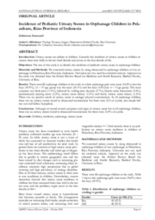Displaying 731 - 740 of 1482
This article discusses how important it is for children in residential care to develop the ability to navigate relationships with each other.
This study explored the perceptions of experts and guardians regarding the early onset of misbehaviour in male, at-risk children in child and youth care centres in South Africa.
Exploring the testimonials collected during a focus group and 45 individual interviews with adult alumni of such institutions the Romanian research team enrolled in the SASCA Project revealed a wide range of forms of violence and traumatic consequences.
This dissertation was an ethnographic narrative study tracking eight young women who were “aging out” or forced to leave their orphanage in Peru, where most of them had spent a majority of their lives. The study examined the way in which a collaborative art community could support the participants as they narrated their lives over a 16-month period of time through photojournaling and social media outlets.
The aim of this special issue of the International Journal of Longitudinal and Life Course Studies is to examine the outcomes of children who were raised for part of their childhood in out-of-home care, including in foster care and institutions.
This paper from the journal of Social Work/Maatskaplike Werk discusses the experiences of parents receiving family reunification services because their children have been placed in child and youth care centres in South Africa.
This article examines the care experiences of former looked‐after children from a residential care setting in South Africa.
The aim of this study is to identify the incidence of pediatric urinary tones in orphanage children in Indonesia.
This paper offers an overview of residential care for children in Japan and its ongoing development.
This article looks at how the orphanage industry serves to tear families apart in order to ‘create orphans’, and argues that convincing foreign contributors to withdraw their support will be key to stopping the ‘orphanage industry’ from flourishing.



